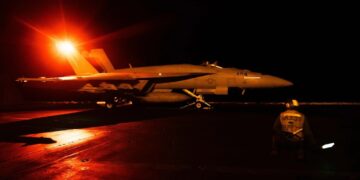FOR IMMEDIATE RELEASE:
February 2, 2024
Contact: press@defensepriorities.org
WASHINGTON, DC—Today, the U.S. carried out strikes in Syria and Iraq as retaliation for the drone attack that killed three U.S. troops on the Jordan-Syria border earlier this week. Defense Priorities Fellow Daniel DePetris issued the following statement in response:
“The latest U.S. strikes on multiple militia targets in Iraq and Syria are meant in part to retaliate for the January 28 drone attack on a small U.S. facility in Jordan, which killed three U.S. troops and injured more than 40 others. President Biden is also trying to accomplish a bigger objective: degrade their capabilities to the point where the militias make the strategic decision to stop attacking U.S. forces in both countries.
“It’s unlikely to succeed. While the U.S. always reserves the right to defend its troops, it’s clear that previous U.S. strikes in Iraq and Syria over the last three months failed to deter much of anything and in fact contributed to the ongoing tit-for-tat dynamics we see today. This has less to do with a lack of U.S. resolve and more to do with the inherent difficulties of influencing the decision-making of non-state actors, who don’t have to worry about defending territory, regime preservation, or maintaining a favorable balance of power. For the militias in Iraq and Syria, their years-long desire to expel U.S. and foreign forces from both countries is unlikely to change regardless of how much firepower the U.S. employs and may even strengthen after this round of strikes.
“If reports are accurate, the U.S. aims to conduct similar strikes over a period of days, if not weeks. This military action may relieve some domestic political pressure, but it will not achieve the desired outcome of neutralizing the problems these militias represent. It will, however, undermine attempts to deescalate and avoid a broader war in the region.
“This episode should serve as a wake-up call to the futility of the current U.S. force posture in the Middle East, particularly in Iraq and Syria, where nearly 3,500 U.S. troops continue to operate in harm’s way on behalf of a counter-ISIS mission that was achieved nearly five years ago. With ISIS’s territorial caliphate destroyed nearly five years ago, the Iraqi government increasingly inclined for U.S. troops to leave, and a state in Syria that is too weak to matter, there is no justification for our current policy. The risks and costs simply outweigh the rewards.”
Author

Daniel
DePetris
Fellow
More on Middle East

April 2, 2025

April 1, 2025

March 30, 2025
Events on Middle East





